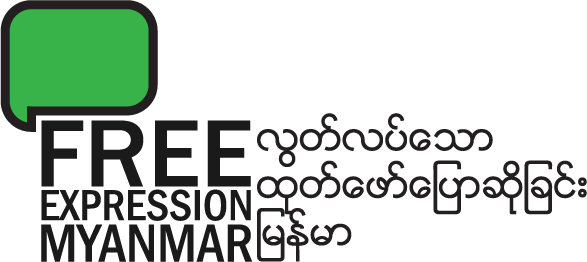Myanmar Digital Rights Forum: New aims agreed for 2018 — မြန်မာဒစ်ဂျစ်တယ်အခွင့်အရေးဖိုရမ် – ၂၀၁၈ ခုနှစ်အတွက် သဘောတူညီထားသော ဦးတည်ချက်များ
On 18-19 January 2018, 130 participants attended the second edition of Myanmar Digital Rights Forum in Yangon to discuss the future of Myanmar’s Internet.
Participants included representatives from civil society, government & parliament, the media, academia and private sector (local as well as global companies including Facebook and Microsoft).
The Forum participants reviewed Myanmar’s Digital Rights situation and agreed on key priorities for 2018:
On equality of access:
- Promoting e-gov, ensuring websites are accessible to all, in compliance with WCAG 2.0 (Web Content Accessibility Guidelines).
- Supporting the Unicode Migration Plan
- Supporting in Implementing initiatives to promote accessibility for persons with disabilities, women and ethnic communities.
On freedom of expression:
- Adopting a right to information law that promotes digital information and protects digital rights
- Repealing Article 66(d) of the Telecommunications Law
- Improving people’s digital literacy using both formal and informal methods, including of MPs and judges.
On privacy:
- Adopting a data protection law that protects users’ privacy and data on line
- Establishing a lawful interception framework
- Improving people’s awareness of the right to privacy.
A cross-cutting priority for all participants was the need for government to improve the way it runs consultations for all new laws and amendments.
Participants also agreed to develop a new Digital Rights Charter to have a collective set of principles to guide future decision-makers.
Speakers at the event said:
“There is little to no public consultation when it comes to developing laws, which is a key challenge. The Citizen Privacy and Security Law, for example, is not well designed and in some ways, violates digital rights,” said Nay Phone Latt, MP for Yangon Regional Parliament.
“The discussions on access to information recommended that where disclosure provisions are already a legal requirement such as in the Investment and EIA laws, this should be fully implemented, and appropriate information disclosure provisions should be included in all new laws. Part of making sure that happens is ensuring that draft laws are subject to a minimum two month online public consultation procedure, with a report on the results of that consultation being submitted to Cabinet before they approve the draft law and send it to Parliament” said Vicky Bowman of MCRB
Sessions on the final day looked at balancing new digital rights, identifying opportunities and challenges in the data revolution, experiences of advocating with the government, and initiatives to combat violence online.
The Forum was co-organised by Phandeeyar, MIDO, Free Expression Myanmar (FEM), MCRB, and EngageMedia, with support from the Government of Sweden. The First Digital Rights Forum was held on 14/15 December 2016.
၂၀၁၈ ခုနှစ် ဇန်နဝါရီလ ၁၈ ရက်နှင့် ၁၉ ရက်များတွင် ကျင်းပခဲ့သော မြန်မာဒစ်ဂျစ်တယ်အခွင့်အရေးဖိုရမ်တွင် တက်ရောက်လာကြသူ ၁၃၀ ကျော်က မြန်မာနိုင်ငံ၏ အနာဂတ်အင်တာနက်အခြေအနေများနှင့် ပတ်သက်၍ ဆွေးနွေးခဲ့ကြသည်။
ဆွေးနွေးပွဲတွင် ပြည်တွင်းပြည်ပမှ အရပ်ဘက်အဖွဲ့အစည်းများ၊ အစိုးရနှင့် လွှတ်တော်၊ Facebook နှင့် Microsoft ကဲ့သို့သော နိုင်ငံတကာကုမ္ပဏီကြီးများက ကိုယ်စားလှယ်များ အပါအဝင် ပုဂ္ဂလိက ကုမ္ပဏီများ၊ သတင်းမီဒီယာများမှ ကိုယ်စားလှယ်စားနှင့် ပညာရပ်ပိုင်းဆိုင်ရာ ကျွမ်းကျင်သူများ တက်ရောက်ဆွေးနွေး ခဲ့ကြသည်။
ဖိုရမ်တက်ရောက်သူများသည် မြန်မာနိုင်ငံ၏ ဒစ်ဂျစ်တယ်အခွင့်အရေးဆိုင်ရာ အခြေအနေများကို သုံးသပ်ဆွေးနွေးပြီး ၂၀၁၈ ခုနှစ်တွင် ဦးစားပေးလုပ်ဆောင်သွားလိုသည်များကို သဘောတူညီခဲ့ကြသည်။
အင်တာနက်ဆက်သွယ်ရရှိအသုံးပြုနိုင်မှု
- E-government ကိုပိုမိုဖြစ်ထွန်းလာပြီး အစိုးရနှင့် သက်ဆိုင်သော ဝက်ဆိုက်များသည် WCAG 2.0 (ဝဘ်ဆိုက်ပါ အကြောင်းအရာများ လွယ်ကူစွာရယူအသုံးပြုနိုင်မှု လမ်းညွှန်များ) အတိုင်းလေးစားလိုက်နာမှုရှိရန်။
- စံစနစ်ယူနီကုတ်သို့ ပြောင်းလဲအသုံးပြုခြင်း အစီအစဥ်များကို အထောက်အကူဖြစ်စေရန်။
- မသန်စွမ်းသူများ၊ အမျိုးသမီးများနှင့် တိုင်းရင်းသားများ၏ အင်တာနက်ရရှိအသုံးပြုနိုင်စေရန် ဖော်ဆောင်မှုများကို အကူအညီ ဖြစ်စေရန်။
လွတ်လပ်စွာ ထုတ်ဖော်ပြောဆိုရေးသားနိုင်မှု
- ဒစ်ဂျစ်တယ် သတင်းအချက်အလက်ကို ပိုမိုစီးဆင်းစေပြီး ဒစ်ဂျစ်တယ် ရပိုင်ခွင့်များကို ကာကွယ်ပေးမည့် လွတ်လပ်စွာ သတင်းအချက်အလက် ရယူပိုင်ခွင့် ဥပဒေကို ပြဌာန်းရန်။
- ဆက်သွယ်ရေးဥပဒေ ပုဒ်မ ၆၆(ဃ) ကို ပယ်ဖျက်ရန်။
- လွှတ်တော်ကိုယ်စားလှယ်များနှင့် တရားသူကြီးများ အပါအဝင် ပြည်သူလူထု၏ ဒစ်ဂျစ်တယ်ဆိုင်ရာ အသိပညာများ တိုးပွားရေး ဆောင်ရွက်ရန်။
အွန်လိုင်းပေါ်ရှိ ကိုယ်ရေးကိုယ်တာ အချက်အလက် လုံခြုံရေး
- အင်တာနက် အသုံးပြုသူများ၏ ကိုယ်ရေးကိုယ်တာအချက်အလက်များကို အကာအကွယ်ပေးသည့် ဥပဒေတစ်ရပ် ပြဌာန်းရန်။။
- တရားနည်းလမ်းကျသော ဆက်သွယ်ရေး ကြားဖြတ်နားထောင်ခြင်း မူဘောင်တစ်ရပ် (Lawful Interception Framework) ထားရှိရန်။
- အွန်လိုင်းပေါ်ရှိ ကိုယ်ရေးကိုယ်တာအချက်အလက်လုံခြုံရေးနှင့် ပတ်သက်၍ ပြည်သူလူထု၏ အသိပညာကို တိုးမြှင့်ရန်။
ဥပဒေသစ်များပြုစုခြင်းနှင့် ဥပဒေဟောင်းများပြင်ဆင်ရာတွင် အစိုးရအနေဖြင့် လူထုထံမှ အကြံဥာဏ်များရယူနေမှုပုံစံကို တိုးတက်ပြောင်းလဲလာစေရန်မှာလည်း တက်ရောက်သူများဦးစားပေးဆွေးနွေးခဲ့သည့် အကြောင်းအရာဖြစ်သည်။
အနာဂတ်တွင် နိုင်ငံ၏ ICT ကိစ္စရပ်နှင့် ပတ်သက်၍ ဆုံးဖြတ်ချက်ချရာတွင် ကိုးကားနိုင်ရန်အတွက် ဒစ်ဂျစ်တယ် အခွင့်အရေးနှင့်ဆိုင်သည့် အခြေခံမူများကို ဒစ်ဂျစ်တယ်အခွင့်အရေးဆိုင်ရာ ပဍိညာဉ် (Digital Rights Charter) တစ်ရပ် ပြုစုရန်ကိုလည်း တက်ရောက်လာကြသူများက သဘောတူညီခဲ့ကြသည်။
ဖိုရမ်တွင်ဦးဆောင်ဆွေးနွေးသူများက
“ဥပဒေရေးဆွဲရာတွင် ပြည်သူလူထုနဲ့ လုံလောက်တဲ့ တိုင်ပင်ဆွေးနွေး အကြံဉာဏ်ရယူခြင်း မရှိတဲ့အချက်က အဓိကအားနည်းချက် ဖြစ်ပါတယ်။ ဥပမာ - နိုင်ငံသားများ၏ ပုဂ္ဂိုလ်ဆိုင်ရာလွတ်လပ်ပိုင်ခွင့် နှင့် လုံခြုံခွင့် ကာကွယ်ပေးရေး ဥပဒေရေးဆွဲတဲ့နေရာမှာ တွေ့ဆုံဆွေးနွေးမှုတွေ လုံလုံလောက်လောက် လုပ်ဆောင်ခြင်း မရှိခဲ့တဲ့အတွက် ဥပဒေရည်ရွယ်တဲ့ အတိုင်း ဖြစ်မလာဘဲ ကိုယ်ရေးကိုယ်တာ အချက်အလက်တွေကို ပြည့်ပြည့်ဝဝ ကာကွယ်ပေးနိုင်ခြင်း မရှိပါဘူး။” ဟု ရန်ကုန်တိုင်းဒေသကြီးလွှတ်တော်အမတ် ဦးနေဘုန်းလတ်က ပြောကြားသည်။
“သတင်းအချက်အလက်တွေကို အများသိရှိအောင် ထုတ်ဖော်ပြောကြားရမယ့် ဥပဒေပုဒ်မတွေက လက်ရှိ ပြဌာန်းပြီး ဥပဒေတွေဖြစ်တဲ့ ဥပမာ ရင်းနှီးမြှုပ်နှံမှုဥပဒေနဲ့ ပတ်ဝန်းကျင်ဆိုင်ရာသက်ရောက်မှု ဆန်းစစ်ခြင်းဆိုင်ရာ ဥပဒေတွေ - မှာ ပါရှိပြီး ဖြစ်တဲ့အတွက် သူတို့ကို အကောင်အထည်ဖော်ဖို့ ဆွေးနွေးချက်တွေက အကြံပြု ပြောကြားပါတယ်။ ဒီလိုပဲ အသစ်ပြဌာန်းမယ့် ဥပဒေတွေမှာလည်း သတင်းအချက်အလက်တွေကို အများသိရှိအောင် ထုတ်ဖော်ပြောကြားရမည့် သတ်မှတ်ချက်တွေကို ပြဌာန်းချက်တွေအနေနဲ့ ထည့်သွင်းဖို့ အကြံပြုကြတယ်။ ဒီလိုဖြစ်ဖို့အတွက် ဥပဒေကြမ်းတွေကို တင်ပြဆွေးနွေးတဲ့အခါမှာ လူထုနဲ့ အနည်းဆုံး နှစ်လအချိန်ပေးပြီး ဆွေးနွေးရမယ်၊ ပြီးတဲ့အခါမှာလည်း အဆိုပါ ဆွေးနွေးချက်များမှ အကြံပြုချက်များကို ဥပဒေကြမ်းကို လွှတ်တော်ကို မတင်ပြခင်မှာ ပြည်ထောင်စုအစိုးရကို တင်ပြရမယ့် လုပ်ထုံးလုပ်နည်းရှိရမယ်။” ဟု မြန်မာ့စီးပွါးရေးကဏ္ဍ တာဝန်ယူမှုရှိရေး အထောက်အကူပြုဌာန (MCRB)မှ Vicky Bowman က ပြောသည်။
ဖိုရမ်ဒုတိယနေ့တွင် ဆွေးနွေးခဲ့သည့် ခေါင်းစဥ်များတွင် လွတ်လပ်စွာ ထုတ်ဖော်ပြောဆိုခွင့်ဆိုင်ရာ ဒစ်ဂျစ်တယ် အခွင့်အရေးများကို ချိန်ညှိခြင်းအကြောင်း၊ အချက်အလက်ဆိုင်ရာ ပြောင်းလဲတိုးတက်လာမှု (Data Revolution) တွင် ကြုံလာရနိုင်သည့် စိန်ခေါ်မှုများနှင့် အခွင့်အရေးများအကြောင်း၊ အစိုးရအား စည်းရုံးအရေးဆိုခြင်းနှင့် ဆိုင်သည့် အတွေ့အကြုံများအကြောင်းနှင့် အွန်လိုင်းပေါ်ရှိအကြမ်းဖက်မှုများကို တိုက်ဖျက်ရန်အတွက် လှုပ်ရှားမှုများအကြောင်းများကို ဆွေးနွေးခဲ့ကြသည်။
ဖိုရမ်ကို ဖန်တီးရာ၊ ဖွံ့ဖြိုးမှုအတွက် မြန်မာ့ ICT အဖွဲ့၊ လွတ်လပ်သောထုတ်ဖော်ပြောဆိုခြင်းမြန်မာ၊ မြန်မာ့စီးပွါးရေးကဏ္ဍ တာဝန်ယူမှုရှိရေး အထောက်အကူပြုဌာန (MCRB)၊ Engage-Media တို့ပူးပေါင်းပြီး ဆွီဒင်အစိုးရ၏ ထောက်ပံ့ကူညီမှုဖြင့် ကျင်းပခြင်းဖြစ်သည်။ ပထမအကြိမ်ဒစ်ဂျစ်တယ်အခွင့်အရေးဆိုင်ရာ ဆွေးနွေးပွဲကို ၂၀၁၆ ခုနှစ်၊ ဒီဇင်ဘာ ၁၄ရက်နှင့်၊ ၁၅ ရက်များတွင် ပြုလုပ်ခဲ့ခြင်းဖြစ်သည်။
